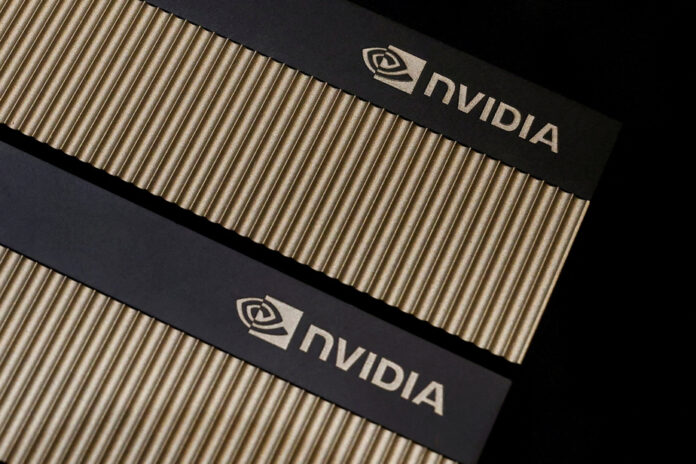(Paris) Nvidia’s results, well above expectations, are not enough to keep the markets in the green on Thursday, the time being for caution before statements from central bankers.
The American processor giant had set the bar high for its second quarter financial results, but far exceeded it with net profit multiplied by nearly 9.4 over one year, to 6.2 billion.
After gaining more than 6% in early trading, the stock was only up 1.47% by 11:55 a.m. EST. But the value of its share has multiplied by almost 3.25 since the beginning of the year.
“We thought that with the results, the best of the whole season, the market was going to take off, as in previous results, but we can see that it’s winded”, observes Frédérik Rozier, portfolio manager at Mirabaud.
Rising in the morning, the semiconductor sector in Europe finally ended down sharply, from Infineon (-2.49%) to STMicroelectronics (-2.48%).
After a sharply higher opening, the technologically-tinged NASDAQ fell 1.37% on Wall Street, the S
“At this valuation level, if Nvidia had released results in line (with expectations), it would have been a purge,” continues Rozier.
In Europe, stock market indices also turned around: Paris lost 0.44%, Milan 0.57%, Frankfurt 0.68%, with only London maintaining a gain of 0.18%.
Investors are directing their eyes to Jackson Hole, in the United States, where the annual conference of central bankers begins on Thursday.
The biggest day is Friday, with speeches by Jerome Powell, the president of the American central bank (Fed), and Christine Lagarde, president of the European Central Bank (ECB).
Mr. Powell “has the opportunity […] possibly to prepare investors for the revision of the forecasts”, particularly in terms of the level of key rates “which is likely at the September meeting”, explains Sonia Meskin, head macroeconomist for the United States at BNY Mellon IM.
On the bond market, government interest rates rose a little in the United States and Europe after three sessions of sharp decline.
The aircraft manufacturer Boeing (-3.62%) announced that it had identified a defect on an element of the 737 MAX which will again disrupt deliveries of its flagship aircraft.
The entire airline sector was in difficulty, especially airlines with -2.55% for United Airlines, but also in Europe with -2.11% for Lufthansa in Frankfurt.
The Turkish lira benefited from the decision of the Central Bank to drastically raise its key rates, from 17.5% to 25%, a measure that investors dared not wait after having been disappointed many times. It soared more than 5% against the dollar, to 25.63 pounds to the dollar around 11:55 a.m. (Eastern time).
A sign of investors’ caution, the dollar was sought after against other currencies: it gained 0.35% against the euro, at 1.0826 dollars for one euro, and 0.75% against the pound at 1, 2633 pound for one dollar.
Bitcoin also lost 1.91% to $26,080 and gold rose 0.27% to $1,920.63 an ounce.
Caution also weighed on oil prices, the barrel of Brent for delivery in October fell 0.26% to 82.99 dollars and that of West Texas Intermediate (WTI) for the same term fell 0.23% to 78.71 dollars.
European natural gas was down sharply around 9:20 a.m. EST as the union at a major Australian gas field reached a tentative agreement with energy giant Woodside, ruling out the possibility that a strike in Australia disrupts liquefied natural gas supply.
The benchmark European contract lost 13.36% to 31.87 euros per megawatt hour, while it approached 45 euros on Tuesday.















